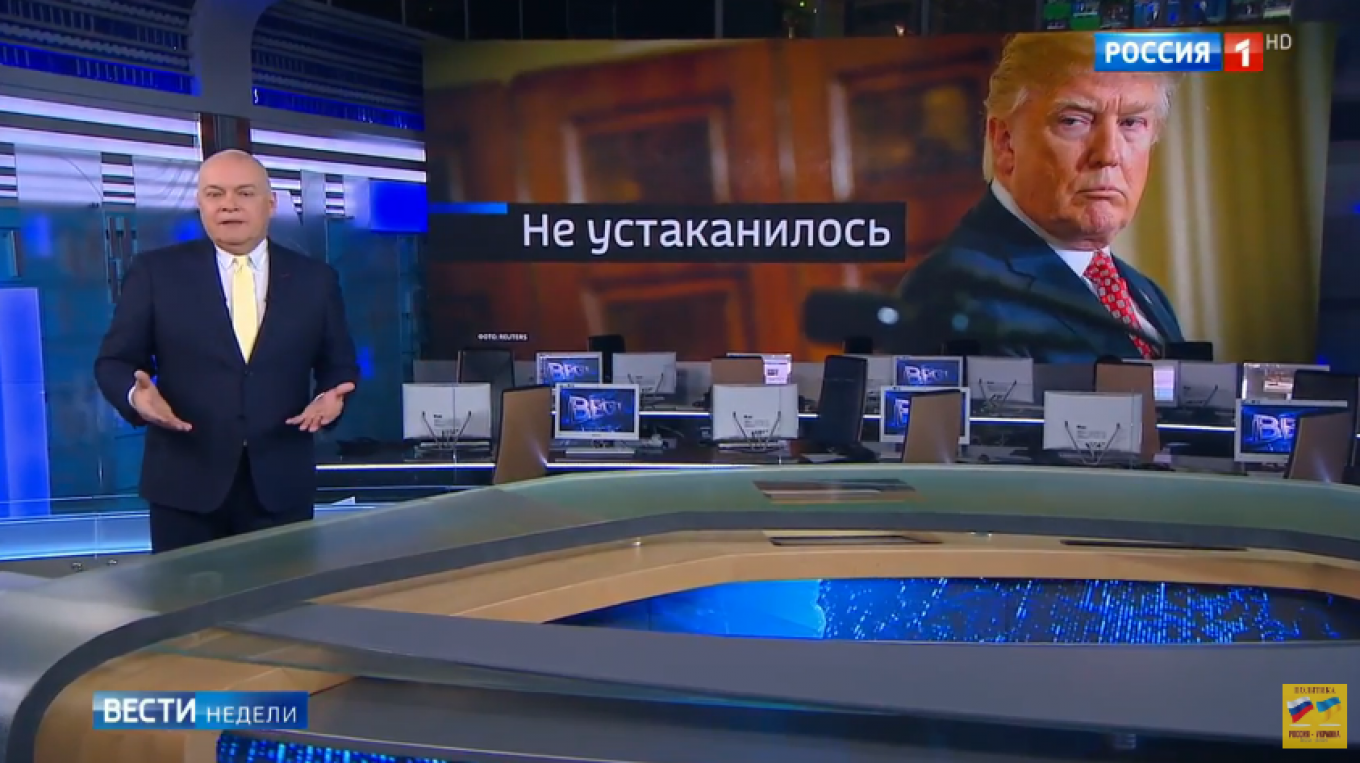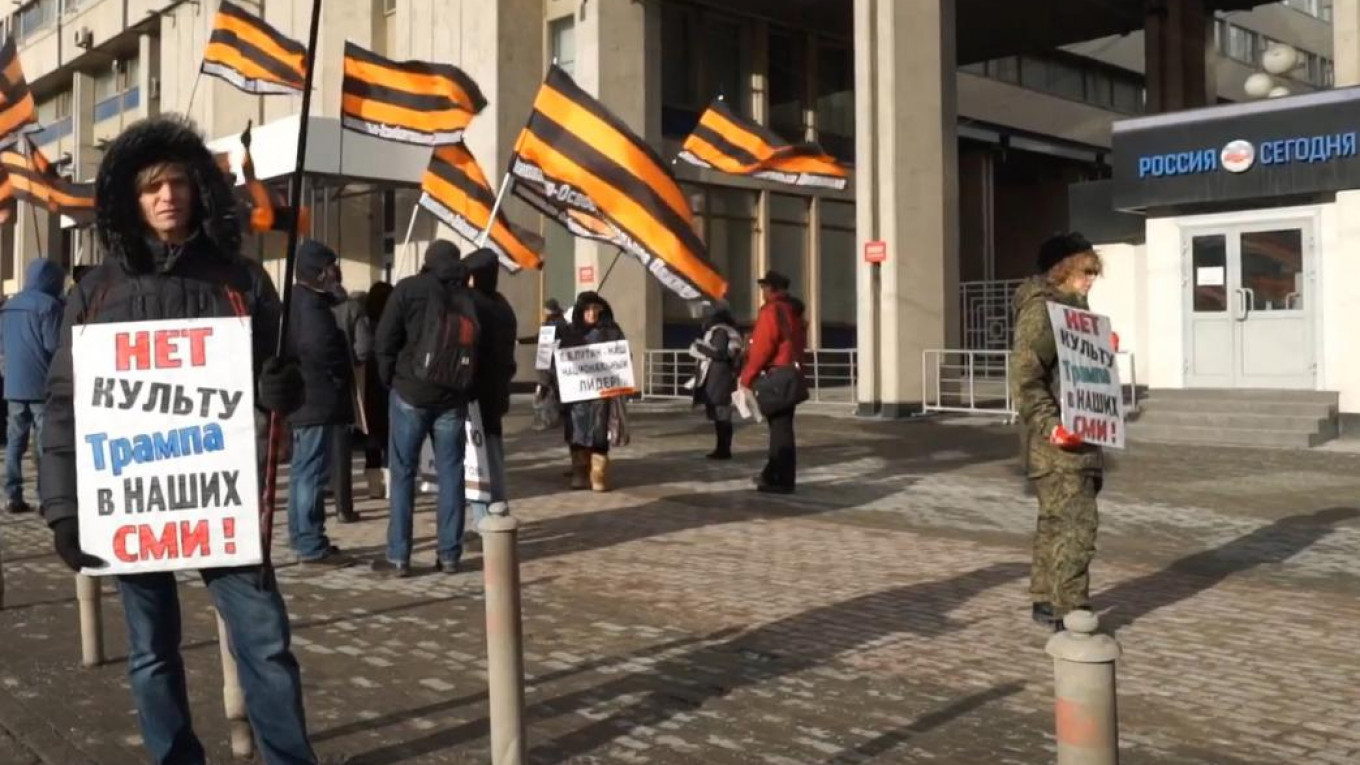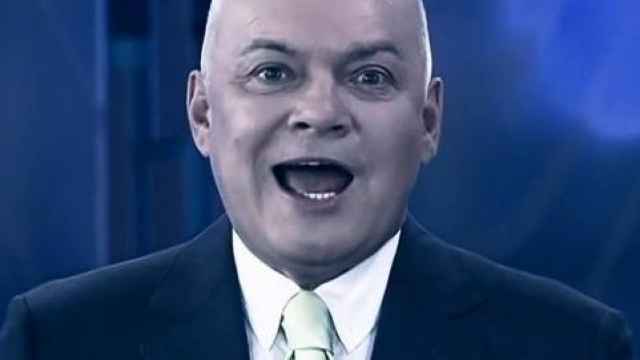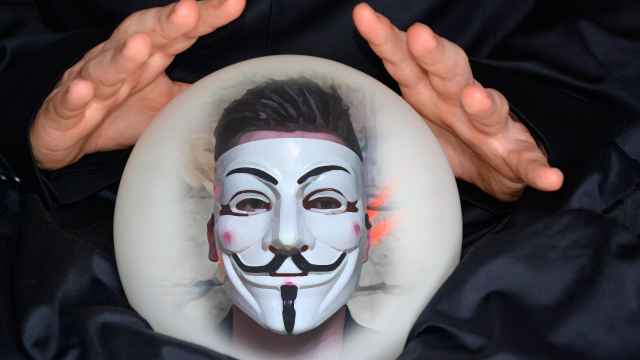According to Bloomberg, and “people familiar with the matter,” Russian TV last week was ordered to tone down coverage of Donald Trump. That development seems plausible enough. Russian state media are, after all directly controlled by Putin’s administration, and Trump is no longer quite the fluffy Russian bunny he once seemed.
But Trump did not completely disappear from the Russian airwaves. However problematic he was, cutting him out completely would be too conspicuous. Not after the year-long orgy of praise heaped upon him by Russian TV.
Dmitry Kiselyov, host of Vesti Nedeli (Weekly News), the flagship news and commentary show on Rossiya channel, made do with a quick mention. Speaking on his Sunday evening show, he defended Trump’s criticism of the mainstream U.S. media as “enemies of the American people.” But almost in the same breath, he criticized Trump for his administration’s “failure to settle down.”
In previous weeks, the airtime devoted to bombastic pro-Trump coverage was well in excess of that devoted to domestic affairs. This week, however, things finished there, and it was on to the next segment.

This was when Kiselyov’s propaganda flagship took an unexpected turn. Rather than focusing on the usual bogeymen — the “CIA shills” masquerading as Russian opposition leaders, the Ukrainian neo-Nazis or the Russophobic neocons in U.S. Congress — Kiselyov turned its attention to fellow Putin loyalists.
Last week demonstrators descended on Kiselyov’s office in downtown Moscow. The group, made up of conspiracy-prone ultra-nationalists, called themselves the “National Liberation Movement.” Not unreasonably, they accused the presenter of “Trumpmania.” They complained Kiselyov had become obsessed by the American president but neglected domestic issues.
This claim was well within the realm of reason, but the movement itself is among the Russia’s most bizarre. One of its core beliefs is that Russia is occupied by the U.S. — and has been so since 1991. The movement’s stated mission is to “liberate” Russia by convincing Vladimir Putin to abolish the separation of powers — “a U.S.-imposed concept alien to Russia.”
Leader of the movement is Yevgeny Fyodorov, an ultra-loyal Russian parliament deputy. Although its members claim it is a grassroots, decentralized organization, it very obviously enjoys protection of Russia’s police (and, most probably, secret services.) NLM routinely attacks opposition rallies and journalists, and gets away with it. Police always look the other way, or arrest their victims instead.
One photographer, David Frenkel, was attacked by NLM thugs at an LGBT rally in St Petersburg, and then himself was arrested. Ekaterina Vinokurova, a fellow reporter and member of an independent journalists’ union, raised the issue at Putin’s annual press conference. Putin feigned ignorance: He hadn’t ever heard of his most devoted fans, he said.
But by their attacks on his offices, NLM had got on the wrong side of Russia’s most well-known anchor. Last Sunday, Kiselyov launched a long tirade against Fyodorov and the NLM. The segment was titled “The Feeble Ones,” and described the movement as a “traveling circus” bent on creating “information noise.” The fact the NLM was using the black and orange ribbon of St George, widely associated with patriotic sentiment in Russia, was “an affront to the proud symbol of Russian armed forces and the struggle against fascism.”
Meanwhile, Kiselyov did not waste the opportunity to attack other uber-loyalists competing for Putin’s attention. Homophobic activist Vitaly Milonov — who now, like Fyodorov, is a parliament member for the ruling party United Russia — found himself on the receiving end of Kiselyov’s biting wit. Milonov’s crime had been to campaign too hard for the transfer of Petersburg’s landmark Saint Isaac’s cathedral to the Orthodox church. “Milonov, knowing that his ramblings could not have been blessed by the church, still carried on with the provocation,” said Kiselyov.
In the same segment, Kiselyov criticized another militant patriotic group, “Officers of Russia,” infamous for hijacking a photographic exhibition and spraying exhibits with urine. Its leader, Kiselov said, had never even served in the Russian military.
All these people, Kiselyov said, were attention-hungry clowns: They were discrediting the idea of patriotism.
Out of Kiselyov’s patriotic targets, so far only Fyodorov has responded. In an interview with the liberal Echo of Moscow radio station, Fyodorov turned on Kiselyov, calling him an “enemy of Putin.” (Kiselyov was, in fact, appointed to his current post in 2013 following an executive order coming from the president.)
In another interview, Fyodorov said that “Kiselyov undermined Russia’s negotiating positions with the U.S.” and was “in fact plotting against the president.”
The extent to which Russian TV had obsessed over America’s 45th president left a very big hole to fill when he disappeared from the agenda. The sight of Russia’s most vocal patriots going for each other’s throats live on air was an interesting way to do deal with the problem.
A Message from The Moscow Times:
Dear readers,
We are facing unprecedented challenges. Russia's Prosecutor General's Office has designated The Moscow Times as an "undesirable" organization, criminalizing our work and putting our staff at risk of prosecution. This follows our earlier unjust labeling as a "foreign agent."
These actions are direct attempts to silence independent journalism in Russia. The authorities claim our work "discredits the decisions of the Russian leadership." We see things differently: we strive to provide accurate, unbiased reporting on Russia.
We, the journalists of The Moscow Times, refuse to be silenced. But to continue our work, we need your help.
Your support, no matter how small, makes a world of difference. If you can, please support us monthly starting from just $2. It's quick to set up, and every contribution makes a significant impact.
By supporting The Moscow Times, you're defending open, independent journalism in the face of repression. Thank you for standing with us.
Remind me later.







